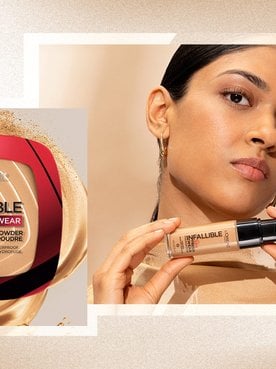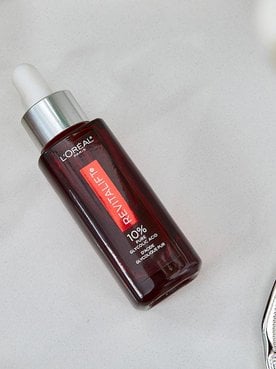You already know that you need to wear sunscreen every day—and we really do mean every day (even if it’s cloudy out)! The sun isn’t just a summer skincare concern; it’s something you need to be cautious about all year round. However, a stroll down the sunscreen aisle can get confusing pretty quickly. For starters, there are tons of different SPF levels, different ingredients to choose from, and various types of lotions, sprays and sticks. All of this information might leave you wondering what is the best sunscreen—chemical sunscreen or physical sunscreen (also known as mineral sunscreen)? Keep reading to learn about the details on both types of sunscreen, as well as the benefits and drawbacks of each option. Becoming more informed on sunscreens will allow you to protect yourself and those you love.
What Is Chemical Sunscreen?
All sunscreen works on the skin by absorbing or shielding the sun’s rays, according to the American Academy of Dermatology (AAD). However, chemical and physical sunscreens work differently to do this. Chemical sunscreen works by using ingredients like oxybenzone and others that are actually absorbed into the top layer of the skin. When taken into the skin, they react with the skin to absorb UV rays and convert them into energy before they can cause damage. In other words, the AAD states that the chemicals act like a sponge to absorb the sun’s rays as they hit your skin. Since these chemicals need to be absorbed into the skin in order to work, chemical sunscreens have to be applied at least 30 minutes before heading outdoors.
Benefits of Chemical Sunscreen
- No white cast: One of the main advantages of chemical sunscreens is that they absorb easily and are typically less likely to leave a white cast on the skin than mineral formulas.
- Lightweight formulas: Chemical sunscreens often have a lighter, more fluid consistency than mineral sunscreens. This can help make them easier to apply and spread evenly.
- Versatile: Chemical sunscreens come in a wide range of formulations, from classic sunscreen lotions to creams, gels, sticks, and even oils. This versatility makes it easier to find a sunscreen that suits your skin type, needs, and lifestyle.
If you’re looking for a versatile everyday sunscreen to add to your skincare routine, we suggest L’Oréal Paris Bright Reveal Broad Spectrum SPF 50 Daily UV Lotion. The non-greasy formula is suitable for all skin types and boasts a lightweight texture that blends seamlessly with all skin tones without leaving behind a white cast.
What Is Physical Sunscreen?
Physical sunscreen, also known as mineral sunscreen, acts like a shield on the skin (rather than a sponge), according to the AAD. This type of sunscreen contains active ingredients like titanium dioxide and zinc oxide, which sit on the skin’s surface and deflect the sun’s rays. While physical sunscreen is typically thicker than chemical sunscreen, a bit harder to rub in, and might leave a white residue behind, it is the smarter choice for those with sensitive skin, per the AAD.
Benefits of Mineral Sunscreen
- Gentle: Mineral sunscreens are generally gentle and non-irritating, making them an ideal option for those with sensitive, reactive, or blemish-prone skin.
- Environmentally friendly: Mineral sunscreens are considered reef-safe, which means they won’t damage coral reefs or disrupt underwater ecosystems.
- Instant protection: One of the most important differences between mineral and chemical sunscreens is how long they take to work. Mineral sunscreens protect your skin immediately, while chemical SPFs, as mentioned above, require a bit of time to absorb before they begin to work.
What Is the Best Sunscreen for You?
As is the case with so many things in life, the answer to this question totally depends on you, as well as how much sun exposure you get. There’s no right or wrong answer when it comes to the mineral vs chemical sunscreen debate. While one person may swear by chemical-based formulas, another may feel that mineral options are best for their skin and lifestyle.
What matters most is that you like the product enough to want to apply it every single day. After all, protecting your skin from the sun—which helps reduce cancer risk and protects against premature skin aging—is the most important thing you can do to keep your skin looking and feeling healthy.
That being said, the AAD always recommends using a broad-spectrum sunscreen that protects against both UVA and UVB rays with an SPF value of 30 or more.
The Hawaii Sunscreen Ban: Oxybenzone and Octinoxate
A couple of the ingredients often found in chemical sunscreens have been the subject of much conversation over the past few years. We’re talking about oxybenzone and octinoxate. According to the AAD, every chemical sunscreen out there contains one or more of the following active ingredients: oxybenzone, avobenzone, octisalate, octocrylene, homosalate, or octinoxate. The use of sunscreens containing two of these ingredients, oxybenzone and octinoxate, has been banned by the state of Hawaii because of their damaging effects on marine environment. According to the legislature of the state of Hawaii, these chemicals have been found to increase coral reef bleaching that can cause damage to coral and other marine animals.
If you’re looking for a sunscreen without oxybenzone and octinoxate, one easy option is to stick with a physical sunscreen. If you prefer chemical sunscreens, you can still use formulas with avobenzone, octisalate, octocrylene, or homosalate as active ingredients, like the L’Oréal Paris Bright Reveal Broad Spectrum SPF 50 Daily UV Lotion.
5 Sun Safety Measures Everyone Should Take
In addition to wearing sunscreen and reapplying it often (at least every two hours and after sweating or swimming), there are a handful of additional ways you can protect yourself from the sun. These tips are especially important to follow if you plan to spend an extended amount of time outdoors, per the FDA.
- Limit your time in the sun, especially between 10 a.m. and 2 p.m. when the sun’s rays are most intense.
- Seek shade when possible, particularly at midday.
- Wear clothing to cover exposed skin (bonus points if it’s UPF clothing, which has built-in sun protection).
- Wear hats, scarves, and UV-protective sunglasses when outdoors.
- When applying sunscreen, use about a shot glass’ worth (one ounce) for your entire body, and be sure to cover all exposed areas, including the tops of your feet, neck, and ears.
Next Up: Do I Still Need Sunscreen If My Foundation Has SPF?
Photo Courtesy of L'Oréal Paris







